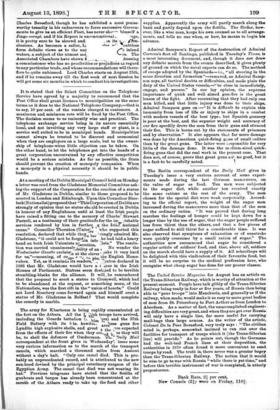At a meeting of the DablinMunicipal Council held on Monday
a letter was read from the Gladstone Memorial Committee ask- ing the support of the Corporation for the erection of a statue of Mr. Gladstone in Dublin, similar to those proposed to be erected in London and Edinburgh. Upon this Councilior Sher- lock (Nationalist) proposed that " This Corporation of Dablin are strongly of opinion that no statue should be erected in Dublin in honour of any Englishman until at least the Irish people have raised a fitting one to the memory of Charley` Stewart Parnell, as a testimony of their gratitucTe for the im 7ishable services rendered by him in further., 1g the Iris? national cause." Councillor Thornton (Uniorce who supported this resolution, declared that while theyie hop 'rongly admired Mr. Gladstone, "it could not be forgotin hate he had laid a heavy
i lists* The resolu- " scretion. band on both Irish Unionists a
tion was carried unanimouslv„hility of an , No wonder the Westminster Gazette exclai 17.n at the elever' lake it very hard for us,"—meaning, of caw, r pieL the English Home- rulers. Yet, as it remincle its readers, , .-exton declared in 1886 that Mr. Gladstone would have a E acne in the Irish Houses of Parliament. Statues seem destiaed to be terrible stumbling-blocks for the alliance. It will„be remembered that the proposal to erect a statue to Cromwell, which had 'to be abandoned at the request, or something more, of the Nationalists, was the first rift in the " union of hearts." Could not Lord Rosebery come forward again and himself erect a statue of Mr. Gladstone in Belfast P That would complete the comedy in marble.


































 Previous page
Previous page